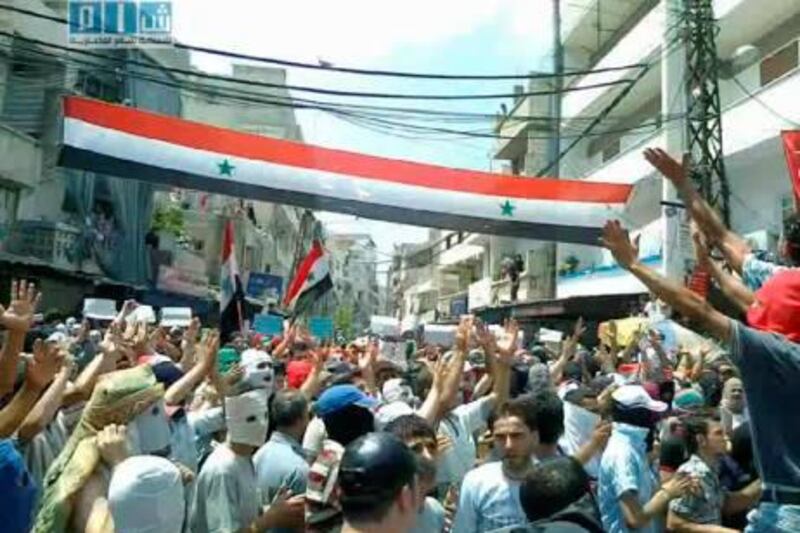DAMASCUS //Syria's rapidly deepening international isolation accelerated further yesterday, with Kuwait and Bahrain following Saudi Arabia in recalling their ambassadors and demanding an immediate halt to a violent crackdown on civilian demonstrators.
As a deadly tank-backed military assault on the eastern city of Deir Ezzor continued, the Arab League made its first formal statement on the situation, telling Syria it must launch a "serious dialogue" with protesters seeking sweeping political reforms to the autocratic regime led by President Bashar Al Assad.
Reinforcing the wave of criticism, one of Sunni Islam's leading clerics, Grand Imam Ahmed Al Tayeb, yesterday called on Damascus to "end the bloodshed".
"The vast repression, the use of the highest levels of violence, arrests and intimidation represent an unacceptable human tragedy," the Cairo-based scholar said.
Neighbouring Jordan also called on Mr Al Assad to implement genuine political reforms while the Turkish foreign minister, Ahmet Davutoglu, is due in Damascus today with a message that Ankara's patience with its former ally has run out.
Indications of dissent reaching into elite Syrian circles appeared yesterday, with 41 well-connected former government ministers and Baath party officials condemning the regime's handling of the crisis.
Launching the Democratic National Initiative, the group, led by former information minister Mohammad Suleiman, demanded an end to security service violence and said the regime and street protesters should be represented in a transitional government.
"Continuation of the security solution is not a choice and use of the armed forces, arresting thousands of people is not acceptable. It puts sticks in the wheel of political change," they said. "Military operations block the democratic opening."
Brushing aside newly unveiled election and political parties laws, they insisted the constitution needed to be rewritten entirely and Syria turned into a genuine parliamentary democracy within a year.
The rapid succession of sharply critical warnings from Arab states - especially regional heavyweight Saudi Arabia - came after months of silence, and appeared to have shocked the Syrian authorities. By yesterday evening there was still no official reaction.
Al Watan, a privately owned Syrian newspaper supportive of the regime, made it clear that Damascus had believed it could count on Riyadh's continued silence. "Kind Abdullah surprised the Syrians at a very late time with his speech," the paper reported.
It accused the Saudi monarch of following a US agenda and implied that Saudis were supplying weapons, money and sectarian ideology to "terrorist" groups in Syria.
Damascus, which prides itself on its Arab credentials, insists it is fighting a well-organised extremist Islamic insurgency, not facing a peaceful popular uprising, while also insisting it is pushing through democratic reforms. Both claims have been given short shrift by Syrian demonstrators and much of the international community.
King Abdullah issued his starkly worded caution to Damascus on Sunday evening, before announcing the recall of the Saudi ambassador.
"Syria should think wisely before it's too late and issue and enact reforms that are not merely promises but actual reforms," he said. "Either it chooses wisdom on its own or it will be pulled down into the depths of turmoil and loss."
Those comments followed the powerful Gulf Cooperation Council (GCC), United Nation's chief Ban Ki Moon and Pope Benedict XVI urging an end to Syrian government violence and implementation of reforms.
In a statement yesterday, the US State Department said it was "encouraged, heartened" by a tougher stand taken by Arab countries towards Syria's crackdown.
On Thursday, Moscow had also issued its first real condemnation of Syria, backing a critical UN Security Council statement it had previously blocked. Russian President Dmitry Medvedev said his Syrian counterpart would face a "sad fate" unless genuine reforms were quickly forthcoming.
Syria had previously said it was banking on Russia, an old Cold War ally, to shield in world diplomatic circles.
"In the space of less than a week, the Syrian regime has seen its international position nosedive beyond its worst fears," said an independent Syrian analyst, who spoke on condition of anonymity. "Damascus has seriously miscalculated with this Ramadan military offensive, which has been so blatant and provocative that even its allies can no longer make excuses for it."
Western nations have long condemned Syria over its tactics, which according to human right groups, have seen more than 2,000 civilians killed by security services since the March uprising began. But Arab states and Russia had not joined that consensus, until Syrian military forces moved into Hama and Deir Ezzor as Ramadan started last week.
Syria can still count on its closest ally, Iran, however as well as Hizbollah, the militant Lebanese group that both states back. Major world powers like India and China have also refused to join in the growing chorus of criticism, apparently fearing that a collapse of the Assad regime will result in an extremist Islamic state taking its place.
"We still do not have a clear count of the dead in Hama and Deir Ezzor but the numbers will run into hundreds, and many more have been wounded and will not get the medical treatment they need because of the siege," said a human rights campaigner in Damascus.
Conditions in Hama appeared to have eased slightly yesterday compared to last week when tanks shelled residential areas, activists said. Syrian media described the situation as "returning to normal" and again denied that an artillery bombardment of Deir Ezzor had ever taken place.
Also yesterday, Mr Al Assad yesterday replaced defence minister General Ali Al Habib with General Daood Rajha, a 64-year-old artillery specialist and the army chief of staff. State-media said the step was taken as a result of presidential meetings with citizen delegations but noted that Gen Al Habib was in ill health.
Analysts and opposition activists said the ministerial reshuffle would make no difference to regime policies, which are determined by the president and his close inner circle, rather than government officials.
psands@thenational.ae





